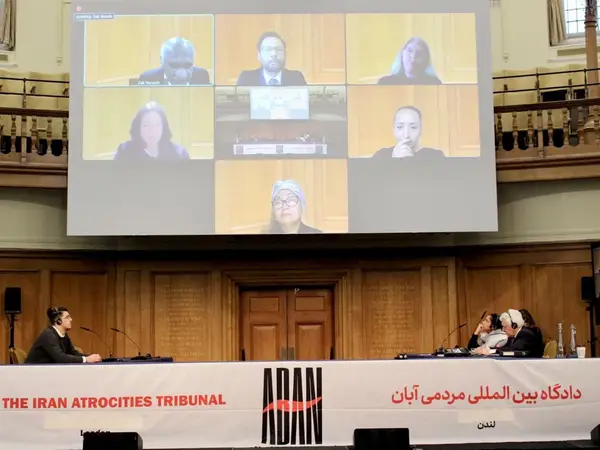The Iran Atrocities Tribunal investigating gross rights violations has charged 160 officials of the Islamic Republic with "committing crimes against humanity".
The tribunal was established in 2020 to investigate the killing of hundreds of protesters in nationwide protests in Iran in November 2019. Concluding its second round of hearings in London on Sunday released a list of the accused officials, which includes Supreme Leader Ali Khamenei.
Heads of the executive and judiciary branches of the government, ministers, commanders from the Revolutionary Guards and police as well as officials from provincial governors’ offices are named in the list.
The tribunal heard testimonies from 219 witnesses and examined evidence from 440 people related to crimes against humanity, extrajudicial killings and executions, torture, rape of prisoners, and harassment of the families of the victims.
Although the verdicts of the Tribunal are symbolic, the panel of the tribunal called on all those who have more documents and evidence about crimes by officials to submit them.
Earlier in the day, a senior IRGC member, identified as witness 600, said that Khamenei's office ordered the military and paramilitary forces to do whatever is necessary to end the chaos.
Reuters had reported in December 2019 that the order to end protests at any cost had come from Khamenei who was deeply concerned about preserving the clerical regime.
The IRGC officer claimed that 427 people were killed in Khuzestan province and 420 in Tehran alone during the crackdown, adding that about 8,000 people were also arrested in the capital.
Earlier estimates ranged from 300 to 1,500 civilians killed nationwide. The new figure offered by the witness would mean that the overall death toll was much higher.
Organizers of the tribunal say an extensive systematic state policy was behind suppressing protesters with help from Iran’s proxy militia forces from the regional countries.
One of the witnesses said on Saturday that as a member of Iran’s ‘Imam Ali’ anti-riot brigades he had seen the deployment of “violent criminals” as well as members of the Iraqi Popular Mobilization Forces, and the Afghan Fatimiyoun militia, organized and commanded by the Revolutionary Guard (IRGC).
He added that Imam Ali brigades had set gas stations ablaze to blame the fires on the protesters and to justify suppression and had been authorized to shoot protesters in the torso and head to end the unrest.
The tribunal − also known as Aban Tribunal after the Iranian calendar month of Aban when the atrocities took place− was established by the Oslo-based Iran Human Rights (IHR), and the international anti-capital punishment organization Ensemble Contre la Peine de Mort (Together Against the Death Penalty).
The protests were the bloodiest in Iran’s history with security forces opening fire with military weapons on demonstrators in many cities. Thousands were arrested and jailed without due process of law and there were numerous reports of torture in prison.
